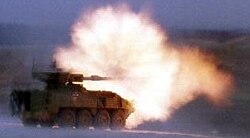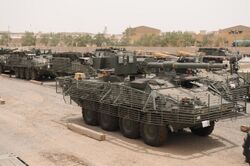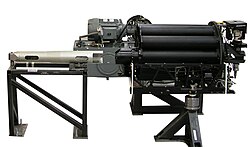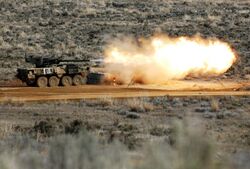Engineering:M1128 Mobile Gun System
| M1128 Mobile Gun System | |
|---|---|
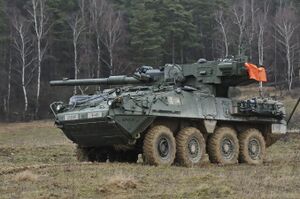 A M1128 Mobile Gun System during a training exercise in 2015 | |
| Type | Assault gun Armored fighting vehicle Tank destroyer |
| Place of origin | Canada , United States |
| Service history | |
| Wars | Iraq War[1] War in Afghanistan |
| Production history | |
| Designer | GM Defense of Canada, General Dynamics Land Systems |
| Manufacturer | General Dynamics Land Systems[2] |
| Produced | 2002–2010 |
| No. built | 142[2] |
| Specifications | |
| Mass | 18.77 tonnes (20.69 short tons; 18.47 long tons) |
| Length | 6.95 m (22.92 ft) |
| Width | 2.72 m (8.97 ft) |
| Height | >2.64 m (>8.72 ft)[3] |
| Crew | 3 |
| Armour | 14.5 mm resistant[4] |
Main armament | M68A2 105 mm cannon[5] |
Secondary armament | 7.62 mm machine gun; M240C coaxial machine gun; 2, M6 smoke grenade launchers |
| Engine | Caterpillar C7 turbo diesel 260 kW (350 hp) |
| Power/weight | 18.65 hp/ton |
| Transmission | Automatic 6 forward, 1 reverse |
| Suspension | 8×8 wheeled |
| Ground clearance | 15 in (38 cm) |
| Fuel capacity | 56 US gallons (212 liters) |
Operational range | 330 miles (528 km) |
| Speed | 60 mph (96 km/h) |
The M1128 Mobile Gun System (MGS) is an eight-wheeled assault gun of the Stryker family, mounting a 105 mm tank gun, based on the Canadian LAV III light-armored vehicle manufactured by General Dynamics Land Systems for the U.S. Army.
The MGS program emerged after the 1996 cancelation of the Army's M8 Armored Gun System, the service's planned replacement for the M551 Sheridan light tank.
The MGS was procured in limited numbers. It has been retired since the end of 2022 due to design and operational deficiencies.[6]
History
Background: Replacing the Sheridan
Following the end of the Cold War some theorists believed that the existing suite of U.S. armored vehicles, designed largely to fight Soviet mechanized forces in Europe, were not well suited to the lower-intensity missions U.S. military would be tasked with.[citation needed]
This led to the development of a new armored fighting vehicle designed for lower-intensity combat, rather than large-scale battle.[7]
By 1992, the Armored Gun System emerged as a top priority procurement program for the Army.[8] The Army requested proposals for a 20-ton air-droppable light tank to replace the M551 Sheridan. The Army sought 300 AGS systems to go to the 82nd Airborne Division and the 2nd Armored Cavalry Regiment. Four competitive bids emerged.[9]
In June 1992, the Army selected the FMC Close Combat Vehicle, Light proposal.[10] This was later type-classified as the M8 Armored Gun System. In 1996, the Army canceled the AGS due to the service's budgetary constraints.[11]
Interim Armored Vehicle competition
The General Dynamics Mobile Gun System originated from the Canadian Armoured Combat Vehicle requirement.[12] In partnership with General Motors, General Dynamics Land Systems (GDLS)–Canada integrated its Low Profile Turret (LPT) onto a LAV III in January 1999.[13] The turret was an updated version of the one used on the GD–Teledyne Expeditionary Tank, which was entered into the Armored Gun System competition in the 1980s.[14]
In October 1999, U.S. Army Chief of Staff Eric Shinseki laid out his vision for a lighter, more transportable force. He called for mid-weight brigades that would strike a balance between heavy armor and infantry.[15] The Army subsequently launched the Interim Armored Vehicle acquisition program. One of the required vehicles was the Mobile Gun System (MGS). According to Shinseki, the MGS's mission differed greatly from the AGS. the AGS was also intended to be used in the anti-armor role, whereas primary targets for the MGS included bunkers, buildings, weapon positions and troops.[16]
A team of GM Defense of Canada and GDLS submitted a variant of the LPT Assault Gun to meet the MGS requirement. General Dynamics was responsible for most of the MGS.[12][clarification needed] United Defense LP proposed an M8 Armored Gun System (AGS) and two variants of the Mobile Tactical Vehicle Light (MTVL), one with the AGS turret and 105mm gun, and another with a 90mm gun.[17] Two other competing contractors submitted bids for infantry carriers, but declined to submit offers for the MGS requirement.[18]
Unlike the infantry carrier variant, MGS prototypes were not evaluated on the Army's proving grounds. This resulted in protests from lawmakers and industry officials. The service maintained that bid samples would be unnecessary and complicate the competition.[19]
In September 2000, the Army told bidders it was considering plans to increase by 200 the number of MGS units purchased. Though the service did not say why it was interested in more MGS units, however Defense Daily speculated that the Army could equip light divisions with the MGS.[20]
In November 2000, GM–GDLS won the contract for both the infantry carrier and MGS. The MGS was later type classified as the M1128.[21][22] GM–GDLS was forced to suspend work on the IAV while the Government Accounting Office evaluated UDLP's protest of the award. GAO denied the protest in April 2001.[23]
Further development and initial production
Soon after the contract was awarded, the MGS IOC date slipped two years from December 2001 to November 2003. The Army allowed GM–GDLS to substitute the Stryker ATGM variant for the MGS in the interim. In its protest, UDLP alleged that the Army had known about the schedule slippage before awarding the contract, and unfairly disregarded this in their decision making.[24]
GDLS delivered the first of eight pre-production Mobile Gun Systems in July 2002.[5]
In March 2004, the Army approved the transfer of four AGS production vehicles to the 82nd Airborne Division to be used in Iraq. In June 2004, this plan was put on hold while the Army determined whether the MGS could meet the 82nd's requirements.[25] In August, the Army conducted an air-drop test of a Stryker M1132 Engineer Squad Vehicle weighted to simulate the load of the MGS. Around the same time, the Army identified issues with the air-dropability of the MGS, among the heavier of the Stryker family. Still more pervasive problems persisted with the autoloader.[26]
In January 2005, the Army said it had ruled out fielding the AGS, saying the system lacked a spare parts inventory that would be required to maintain the vehicle for any significant length of time. The Army doubled down on its belief in the MGS, which it said it could begin fielding in summer 2006.[27]
In October 2004, the Pentagon approved limited low-rate production of the MGS after a Defense Acquisition Board review. During limited production, 14 vehicles were produced. During this time, General Dynamics redesigned the ammunition handling system to be more reliable. In November 2004, the Pentagon approved an Army request to move the vehicle into low-rate production, to a total of 72 vehicles.[28]
On February 2008, the Pentagon approved full-rate production of the MGS after a Defense Acquisition Review.[29] The Army chose to defer production of new vehicles while it waited to validate fixes made to the MGS.[30]
In 2010, GDLS began incorporating explosive reactive armor on MGS production units.[5]
Full-rate production was indefinitely deferred in 2012.[31]
In late 2013, the U.S. Army began seeking to reintroduce an airdroppable mobile airborne protected firepower platform to provide fire support for air assault forces, a capability that had been absent since the retirement of the M551 Sheridan in 1997. General Dynamics initially considered modifying the wheeled Stryker MGS to meet the Mobile Protected Firepower (MPF) program requirement,[32][33] but the company instead entered a variant of the Griffin light tank.[34]
As of May 2016, 3 Mobile Gun Systems had been written off during combat operations out of 142 produced.[5]
Retirement
In May 2021, the Army announced they would divest all Mobile Gun Systems by the end of 2022. The decision was made following an analysis that found its autoloader had become expensive to maintain and that the M1128 had not been upgraded with a Double V-Hull. It was more efficient to eliminate the platform and focus on firepower improvements such as equipping Strykers with 30 mm cannons and CROWS-J mounts, providing better distributed lethality capabilities that will not be lost from removing the MGS.[6][35]
Foreign interest
Canada had liquidated about half of its fleet of Leopard 1 main battle tanks in the early 2000s.[36] The Canadian Army planned to replace the MBTs with 66 Mobile Gun Systems. However in 2007, the Canadian Army reversed itself and decided instead to procure Leopard 2s.[5]
Combat use
The Mobile Gun System saw service in the Iraq War and the War in Afghanistan.[5]
Design
Armor and protection
The MGS has integral all-around armor protection against 14.5 mm AP rounds.[37]
The MGS commander and gunner are located in the turret basket, which provides the crew some separation from the ammunition in the event of an explosion. According to a Government Accounting Office report released in May 2001, the Army had expressed doubt that this arrangement would provide "any protection from secondary explosions and fires from the main gun ammunition."[37]
Firepower
The MGS's low profile turret has a small silhouette, is stabilized and mounts a 105mm M68A1E4 rifled cannon with a fume extractor and an autoloader. The vehicle is primarily outfitted to support infantry combat operations. While it could take on some of the roles of a tank, it is not primarily intended or designed to engage in combat with main battle tanks.[38]
The MGS can store 18 rounds of main gun ammunition: 8 in the autoloader's carousel and 10 in a replenisher located at the rear of the vehicle.[39] It has a rate of fire of ten rounds per minute.[40]
The MGS was originally developed for the Canadian Army, which did not have a requirement for transporting the vehicle via C-130. The U.S. Army did have this requirement, and so a design change was required to lower the MGS's height so that the vehicle could fit inside the aircraft. The turret was lowered within the hull.[41] This change caused problems of its own. The reduced distance between the muzzle brake and the hull caused blast overpressures to develop. A solution was found where the "pepper pot" could be covered by a sheet of metal.[42]
The MGS's 105 mm cannon can fire four types of ammunition: the M900 kinetic energy penetrator to destroy armored vehicles; the M456A2 high-explosive anti-tank round to destroy thin-skinned vehicles and provide anti-personnel fragmentation; the M393A3 high-explosive squash head plastic round to destroy bunkers, machine gun and sniper positions, and create openings in walls for infantry to access; and M1040 canister shot for use against dismounted infantry in the open.[43][44]
In 2001, Rheinmetall announced that it was seeking to incorporate its 105 mm smoothbore low recoil gun on the MGS around 2004. The Army had not articulated such a requirement.[45]
By 2000, the Army found its existing ammunition stockpile of 105 mm rounds to be in poor condition, with more than half determined to be either unusable or obsolete. The Army solicited industry to produce new ammunition to replenish the stockpile.[17] L3 Communications completed low rate production of M393 high-explosive plastic HEP-T and M467 training rounds in 2004. 10,000 combat and 18,400 training rounds were ultimately produced by L3.[5]
Secondary armament
The coaxial weapon is an 7.62 mm caliber M240 machine gun. The commander's weapon is a M2 Browning .50 caliber machine gun or a 40 mm Mk 19 grenade launcher can be mounted.[5]
Differential attributes and failures
Because the vehicle was originally designed without air conditioning (A/C), crews were given cooling vests that circulate cooled water from outside the vehicle to the garment. Vehicle computers still overheated regularly. All MGS Stryker platforms have since been upgraded with A/C units.[46] The large weapon station and relatively smaller hatch can make emergency exits difficult.[1]
The main cannon is separate from the crew compartment. A gun stoppage during combat can be cleared only by exiting the vehicle.[citation needed]
M1128 suffered of lack of reliability, excessive dead space, gun size and gun control issues, taking its development to a limited production in 2010 with 142 units in service.[47]
Organization
As originally projected the U.S. Army allocated nine Mobile Gun Systems (3 per infantry company) to a battalion,[1] making for 27 Mobile Gun Systems per "Stryker brigade" in 2013, but later the Army cut the number per brigade to 10.[32]
As of May 2017, a Stryker brigade combat team is equipped with three platoons of MGS Strykers and three platoons of ATGM Strykers in its weapons troop.[48]
The Army purchased 142 Mobile Gun Systems in total.[49] Three were lost in combat. The Army planned to authorize 32 Mobile Gun Systems to a Stryker Brigade Combat Team (BCT). However due to the low numbers produced, only nine were allocated to a BCT.[5]
A four-vehicle MGS platoon operates organic to a Stryker infantry company, with one MGS in support of a Stryker infantry platoon.[50]
See also
- 2S14 Zhalo-S
- Alvis Saladin
- AMX-10 RC
- AMOS
- B1 Centauro
- LAV-600
- Panhard EBR
- Rooikat
- ZTL-11
- Type 16 maneuver combat vehicle
- M1134 Anti-Tank Guided Missile Vehicle, a Stryker tank destroyer variant
- M8 Armored Gun System, a U.S. Army light tank acquisition program canceled in 1996
- MGM-166 LOSAT, a canceled U.S. Army line-of-sight missile
- Mobile Protected Firepower, an ongoing U.S. Army light tank acquisition program
- XM1202 Mounted Combat System, a U.S. Army Future Combat Systems 20-ton tank canceled in 2011
- XM1219 Armed Robotic Vehicle, a U.S. Army Future Combat Systems unmanned ground combat vehicle canceled in 2011
References
- ↑ 1.0 1.1 1.2 Cox, Matthew (4 February 2008). "Mobile Gun System brings the heat in Iraq". ArmyTimes (Gannett Government Media Corporation). http://www.armytimes.com/news/2008/02/army_new_MGS_080204w/.
- ↑ 2.0 2.1 Green, Michael (22 November 2016). American Wheeled Armoured Fighting Vehicles. South Yorkshire, United Kingdom: Pen & Sword Books Ltd. p. 192. ISBN 978-1473854369. https://www.bookdepository.com/American-Wheeled-Armoured-Fighting-Vehicles-Michael-Green/9781473854369. Retrieved 28 May 2020.
- ↑ "Equipment: Mobile Gun System vs. Leopard tank". http://www.cbc.ca/news2/background/cdnmilitary/equipment.html.
- ↑ "Army Fact File – Stryker". http://www.army.mil/factfiles/equipment/wheeled/stryker.html.
- ↑ 5.0 5.1 5.2 5.3 5.4 5.5 5.6 5.7 5.8 Foss, Christopher F. (2017). Jane's Land Warfare Platforms: Armoured Fighting Vehicles 2017-2018. Surrey: Janes Information Group. pp. 269–271. ISBN 978-0-71063-227-2.
- ↑ 6.0 6.1 The Army Is Ditching All of Its Stryker Mobile Gun Systems. Military.com. 12 May 2021.
- ↑ Rottman, Gordon L. (2012-09-20) (in en). Stryker Combat Vehicles. Bloomsbury Publishing. ISBN 978-1-78200-490-5. https://books.google.com/books?id=tIelCwAAQBAJ&dq=from+the+1950s+onwards+the+US+army&pg=PA5.
- ↑ Richard, Lardner (2 March 1992). "Service Emphasizes Lighter Forces: in New World, Armored Gun System Ranks as Army's Top Procurement Priority". Inside the Pentagon (Inside Washington Publishers) 8 (11): pp. 1, 11–13. https://www.jstor.org/stable/43987842.
- ↑ "The Contenders: Four Teams Compete for Armored Gun System Contract". Inside the Pentagon (Inside Washington Publishers) 8 (11): p. 12. 12 March 1992. https://www.jstor.org/stable/43987850.
- ↑ "Fmc Selected to Build Armored Gun System: Army's Ags to Feature All-welded Aluminum Hull, Detroit Diesel Engine". Inside the Pentagon (Inside Washington Publishers) 8 (24): p. 13. 11 June 1992. https://www.jstor.org/stable/43988110.
- ↑ Sherman, Jason (12 February 1996). "Service Still Seeking OSD Support: Army's Decision to Terminate AGS Meets Stiff Resistance on Capitol Hill". Inside the Army (Inside Washington Publishers) 8 (6): pp. 1, 9–10.
- ↑ 12.0 12.1 Baumgardner, Neil (1 September 2000). "General Motors Trumpets General Dynamics Deal For Meeting IAV Requirements". Defense Daily (Access Intelligence) 207 (44). https://link.gale.com/apps/doc/A64982905/ITOF?u=wikipedia&sid=bookmark-ITOF&xid=cb5c4124.
- ↑ Foss, Christopher F., ed (2011). "Reconnaissance Vehicles". Jane's Armour and Artillery 2011–2012 (32nd ed.). Surrey: Janes Information Group. pp. 219–221. ISBN 978-0-71062-960-9. https://archive.org/details/janesarmourartil0000unse.
- ↑ Baumgardner, Neil (22 November 2022). "Competitors Line Up for Medium Armored Vehicle". Defense Daily (Access Intelligence) 204 (35). https://link.gale.com/apps/doc/A57772946/ITOF?u=wikipedia&sid=bookmark-ITOF&xid=80d5b64d.
- ↑ MacRae, Catherine (14 October 1999). "Service Wants to Be Lighter, Faster, More Lethal: Army Chief of Staff's 'vision' Is Focused on Medium-weight Force". Inside the Army (Inside Washington Publishers) 15 (41): p. 6. https://www.jstor.org/stable/43995956.
- ↑ United States Congress House Committee on Armed Services (2001) (in en). Hearings on National Defense Authorization Act for Fiscal Year 2001--H.R. 4205 and Oversight of Previously Authorized Programs, Before the Committee on Armed Services, House of Representatives, One Hundred Sixth Congress, Second Session: Full Committee Hearings on Authorization and Oversight, Hearings Held February 9, 10, 17, March 15, 22, and 23, 2000. U.S. Government Printing Office. p. 755. ISBN 978-0-16-065653-8. https://books.google.com/books?id=ECVliCA0hxEC&dq=%22M8+armored+gun+system%22&pg=PA755. Retrieved 17 August 2023.
 This article incorporates text from this source, which is in the public domain.
This article incorporates text from this source, which is in the public domain.
- ↑ 17.0 17.1 Burger, Kim (4 December 2000). "Stockpile May Not Be Suitable for New Lav III: Army Preparing to Procure 105 mm Ammunition for New Gun System". Inside the Army (Inside Washington Publishers) 12 (48): pp. 13–14. https://www.jstor.org/stable/43985160.
- ↑ Burger, Kim (9 October 2000). "Iav Source Selection May Come This Week: Chosen Vehicle Less Important Than New Concept, Observers Say". Inside the Army (Inside Washington Publishers) 12 (40): pp. 7–9. https://www.jstor.org/stable/43985072.
- ↑ Burger, Kim (29 May 2000). "Aberdeen Event Called a 'dipstick Check' Army Prepares for Iav Bid Sample Tests, Assures Controlled Setting". Inside the Army (Inside Washington Publishers) 12 (21): pp. 1, 12. https://www.jstor.org/stable/43984790.
- ↑ Baumgardner, Neil (29 September 2000). "Army Interested In Possible Buy Of 200 Additional Mobile Gun Systems". Defense Daily (Access Intelligence) 207 (63). https://link.gale.com/apps/doc/A65648994/ITOF?u=wikipedia&sid=bookmark-ITOF&xid=e31bb105.
- ↑ Burger, Kim (20 November 2000). "LAV Variants Will Require Some Development: Testing of New Interim Vehicle May Upset Army's Fielding Schedule". Inside the Army (Inside Washington Publishers) 12 (46): pp. 1, 6–7. https://www.jstor.org/stable/43985129.
- ↑ "M8 Armored Gun System - Archived 3/2004". Forecast International. https://www.forecastinternational.com/archive/disp_pdf.cfm?DACH_RECNO=433.
- ↑ Winograd, Erin Q. (7 May 2001). "GAO Releases Redacted Decision: UDLP Won't Pursue Further Action to Overturn Army's IAV Decision". Inside the Army (Inside Washington Publishers) 13 (18). https://www.jstor.org/stable/43985396.
- ↑ Burger, Kim (15 January 2001). "In-lieu-of Vehicle Helped Gm-gdls Win, Company Says: Udlp Offers Additional Evidence of Army Bias in Favor of Lav III". Inside the Army (Inside Washington Publishers): pp. 1, 6–7. https://www.jstor.org/stable/43984265.
- ↑ "GDLS given $500,000 to pursue air-drop test: Army to Delay Armored Gun System Delivery Until MGS Tests Complete". Inside Defense - Inside the Army 16 (23). 7 June 2004. https://www.jstor.org/stable/24822615.
- ↑ "Cody: Answer Could Lie Outside Army: Army Re-evaluates Airborne Division's Request for Ags-like Platform". Inside Defense - Inside the Army 16 (44). 1 November 2004. https://www.jstor.org/stable/24821748.
- ↑ "Rep. Hayes Dissatisfied With Response to Query on Ags: Army Still Backing Stryker Mgs to Fill Year-old Request for Firepower". Inside Defense -Inside the Army 17 (6). 14 February 2005. https://www.jstor.org/stable/24823120.
- ↑ DiMascio, Jen (14 November 2005). "Gd to Manufacture Three Mgss This Month: Krieg Allows Mobile Gun System to Move Into Low-rate Production". Inside the Army (Inside Washington Publishers) 17 (45). https://www.jstor.org/stable/24823189.
- ↑ Censer, Marjorie (25 February 2008). "Now Awaiting Army Secretary Certification: DoD Approves Stryker Mobile Gun System for Full-rate Production". Inside the Army (Inside Washington Publishers) 20 (8): pp. 1, 9. https://www.jstor.org/stable/24826412.
- ↑ Marjorie, Censer (24 August 2009). "Service to Wait for Validated Fixes: Army Defers Spending Fy-09 Funds on Stryker Mobile Gun System". Inside the Army (Inside Washington Publishers) 21 (33): pp. 1, 8–9. https://www.jstor.org/stable/24830977.
- ↑ Brannen, Kate. "AUSA: U.S. Army Plans Post-War Management of Stryker Fleet." Defense News. February 23, 2012.
- ↑ 32.0 32.1 Cox, Matthew (20 September 2013). "Army Looks to Mount 30mm Cannons on Strykers". Military.com. http://military.com/daily-news/2013/09/20/army-looks-to-mount-30mm-cannons-on-strykers.html?comp=7000023317828&rank=1.
- ↑ U.S. Army in the Market for ‘Light’ Tanks - Nationaldefensemagazine.org, 7 October 2013
- ↑ General Dynamics presents new Griffin technology demonstrator of light tank for U.S. airborne troops - Armyrecognition.com, 5 October 2016
- ↑ US Army scraps Stryker mobile gun systems in favor of new lethality upgrades. Defense News. 12 May 2021.
- ↑ Major Howard Mark Anthony, Close Combat Vehicle and Leopard 2 Main Battle Tank: Back in the Heavyweight Fight, Canadian Forces College, pg 13, Footnote 21, https://www.cfc.forces.gc.ca/259/290/298/286/anthony.pdf Accessed 2019-11-17
- ↑ 37.0 37.1 "United Defense Decides Against Taking IAV Protest To Court". Defense Daily (Access Intelligence) 210 (23). 2 May 2001. https://link.gale.com/apps/doc/A74016924/ITOF?u=wikipedia&sid=bookmark-ITOF&xid=b5997ec6.
- ↑ "Stryker mobile gun system replenisher". https://www.meggittdefense.com/product/stryker-mobile-gun-system-replenisher/.
- ↑ "Stryker mobile gun system replenisher". https://www.meggittdefense.com/product/stryker-mobile-gun-system-replenisher/.
- ↑ Ogg, David (2001-06-18). "The Road To The Objective Force "Armaments for the Army Transformation"". Firepower Symposium: 32. https://apps.dtic.mil/dtic/tr/fulltext/u2/a393782.pdf.
- ↑ Baumgardner, Neil (14 April 2000). "United Defense Disappointed by Cancellation of IAV Mobile Gun System Vehicle Evaluation". Defense Daily (Access Intelligence) 206 (10). https://link.gale.com/apps/doc/A61544983/ITOF?u=wikipedia&sid=bookmark-ITOF&xid=dcb863f0.
- ↑ Plummer, Anne (21 July 2003). "Lowered Turret Complicates Design: After Brief Hiatus, Army Resumes Stryker Mobile Gun System Testing". Inside the Army 15 (29). https://www.jstor.org/stable/24820277.
- ↑ M1128 Stryker Mobile Gun System - Globalsecurity.org
- ↑ "Archived copy". http://www.dtic.mil/ndia/2013armament/Hill.pdf.
- ↑ "Rheinmetall Offers 105mm Smoothbore Gun For Mobile Gun System Upgrade". Defense Daily (Access Intelligence) 212 (21). 30 October 2001. https://link.gale.com/apps/doc/A79552923/ITOF?u=wikipedia&sid=bookmark-ITOF&xid=4e3b7488.
- ↑ "PM (Preventive Maintenance) Keeps Strykers Combat Ready!". https://www.logsa.army.mil/psmag/archives/PS2017/781/781-03-05.pdf.
- ↑ Green, Michael (2016-10-31) (in en). American Wheeled Armoured Fighting Vehicles. Pen and Sword. ISBN 978-1-4738-5436-9. https://books.google.com/books?id=3vq0DQAAQBAJ&dq=the+Stryker+Arrives+Scene&pg=PA157.
- ↑ "Stryker Brigade Combat Team Weapons Troop". https://armypubs.army.mil/epubs/DR_pubs/DR_a/pdf/web/ARN3238_ATP%203-21x91%20FINAL%20WEB.pdf.
- ↑ Uparmored Bradley Could Be Tough Enough For AMPV: Testers - Breakingdefense.com, 29 January 2014
- ↑ Stryker Mobile Gun System (MGS) – Office of the Director, Operational Test & Evaluation. 2013
External links
 |
